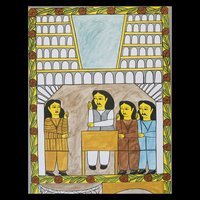Frank Korom
Boston University, Religion, Faculty Member
Research Interests:
Research Interests: History, Performance Studies, South Asian Studies, Nationalism, Language Policy and Politics of Identity, and 15 moreSouth Asian Politics, Nationalism And State Building, Bengali Literature, Bangladesh, South Asian Religions, History of Nationalism, Bangladesh Studies, Nationalism & Conflict, Linguistic Nationalism, Ethnonationalism, Bengali, Language and Politics, Linguistic Imperialism in Postcolonial Era and Language Planning and Policy, Bengali Language and Literature, and Nationalism and Decolonization
Building on Michel Foucault’s notion of gouvernementalité, which he developed during the later years of his life, from approximately 1977 until his death in 1984, I wish to explore some strategies that a certain group of people in India... more
Building on Michel Foucault’s notion of gouvernementalité, which he developed during the later years of his life, from approximately 1977 until his death in 1984, I wish to explore some strategies that a certain group of people in India use to cope with being governed as well as those used to subvert the mentality of governance.1 Governmentality, the English equivalent of Foucault’s French term, is here defined as the strategies utilized to render a given society governable.2 This essay will explore how the vernacular bardic tradition of narrative picture painting has been co-opted and used by the state to convey ideological positions when local disasters occurred in the state of West Bengal, India. The theme of counter-hegemonic discourse will also be addressed by demonstrating how the bards in question provide their own running commentaries on tragic events that quite often go against the officially sanctioned positions of local governmental agencies. Non-governmental organization...
Research Interests:
This article explores the shifting role of slaughter and meat consumption in Bhutan as a result of the recent religionization of Bhutanese politics and as a case of religious nationalism. It argues that there is a tension between... more
This article explores the shifting role of slaughter and meat consumption in Bhutan as a result of the recent religionization of Bhutanese politics and as a case of religious nationalism. It argues that there is a tension between customary meat consumption and traditional blood sacrifice and the Buddhist nonviolent ritual practice of tsethar that is propagated as a central part of modern Bhutanese nationalism and good citizenship. This tension has created a situation where animal welfare and vegetarianism are dominant in the public discourse while slaughter and meat consumption still continue—but as concealed and obscure practices. The article presents data from ethnographic fieldwork and other sources to demonstrate how this process has played out in practice.
Research Interests:
Associate Professor of Religion and Anthropology, Boston University, September 2004-August 2009 Assistant Professor of Religion and Anthropology, Boston University, September 1998-August 2004 Curator of Asian and Middle Eastern... more
Associate Professor of Religion and Anthropology, Boston University, September 2004-August 2009 Assistant Professor of Religion and Anthropology, Boston University, September 1998-August 2004 Curator of Asian and Middle Eastern Collections, Museum of International Folk Art, September 1993August 1998 Adjunct Lecturer in Religion and Anthropology, Santa Fe Community College, January 1994-August 1998 Postdoctoral Fellow, Smithsonian Institution, Center for Folklife Programs and Cultural Heritage, September 1992-August 1993 Cultural Consultant, Ford Foundation, New Delhi and Dhaka Offices, Intermittently May 1989-July 1990
